- Home
- Jessica Day George
Silver in the Blood Page 5
Silver in the Blood Read online
Page 5
“I never forget,” her brother said calmly. “How could I? But I do not approve.”
“You do not approve?” Aunt Kate’s voice was cold. “It is not for you to approve. It is for you to uphold the honor of the family—or are those words only flung in my face?”
“Do not remind me,” Horia said. Dacia heard him sigh heavily, even through the door. “You have been gone too long, Katarina, to truly understand. Gone too long, and returned with nothing to show for it.” A heavy pause. “And your own sins are tainting your thoughts, even now.”
Heavy steps approached the door, and Dacia sprang away. Or she tried, anyway. Radu had come up behind her so silently she hadn’t even noticed him there, and now she ran right into him. He jumped back and then to the side, trying to move out of her way, and stepped on her foot instead. She let out a cry and lurched sideways, Radu tried to catch her, and they both fell to the floor in a heap.
The library door opened.
“Radu, what is this?”
“Dacia, behave yourself!”
Aunt Kate and Uncle Horia were standing above them wearing matching annoyed looks. Radu and Dacia looked at each other, and then at the adults standing over them, and just shrugged. Normally Dacia would have laughed, but not after hearing what she had just heard.
“Ana Katarina, what is going on here?”
The new voice was sharp, the Romanian very formal. And very angry.
Dacia, who was facing away from the speaker and looking up at her aunt, saw Kate go pale. Swallowing, Dacia pushed her skirts down so that they covered her legs and feet, and then twisted around slowly to face whoever it was who had frightened Aunt Kate.
She found herself looking at a very old and rather stout woman wearing a traditional embroidered dress and a headscarf. She looked like the matron of some goat-herding clan, and the top of her head would not have reached Dacia’s chin, yet somehow she seemed to dominate the hall. Dacia goggled at her while the old woman stared back with great disdain, then struck the floor with the tip of her carved walking stick.
“Get up,” the old woman ordered.
Dacia scrambled to her feet, cheeks burning, and made a little curtsy to the old woman, who in point of fact barely came up to Dacia’s shoulder. She was shaped like a barrel: hard and strong without a hint of softness. Her white blouse was thickly embroidered with gold thread and tiny red beads, and her apron was so stiff with more beads and embroidery that Dacia didn’t think the woman could sit down.
“Doamna,” Dacia murmured.
“Do you know who I am?” The old woman’s black eyes raked Dacia from head to toe.
“No, doamna,” she said meekly.
“I am Lady Ioana Florescu. Your grandmother,” the old woman said, neither offended by Dacia’s ignorance nor noticeably appeased by her humility now.
Her grandmother? Dacia gaped unbecomingly. This was a grandmother of a different stripe than she was used to. Clearly this grandmother didn’t invite confidences, or hold little tea parties in the back garden, the way her grandmother Vreeholt did. And Dacia was relatively sure that there were no small dogs playing about on the rug in front of the fire at this grandmother’s house, either.
“It’s very nice to meet you, Grandmother,” Dacia said.
“You will call me Lady Ioana,” the old woman snapped. “I am the head of this family, not some daft old woman who keeps biscuits in a jar for sticky little children!”
“My apologies, Lady Ioana,” Dacia said.
She found herself missing Grandmother Vreeholt with a sharp stab of longing. This frightening old woman was just one more trial in a long list of horrors since she had started on this journey.
“Perhaps you’ll do,” Lady Ioana said, but not with any real approval. “Come with me into the library; I have words to say to you.” She looked down at Radu, who was still crouched on the floor. “Get up, you stupid boy! You’re the worst of the lot.”
“I’m sorry, Lady Ioana,” Radu mumbled, and scrambled to his feet, bowing.
“Radu, why don’t you come with us?” Dacia did not want to be alone with this nasty old woman. Even having Radu standing in the corner looking awkward would be better than nothing.
“I don’t wish to speak to Radu,” Lady Ioana barked, striding across the hall toward the library door. “I’ve spoken to him enough, and yet he never improves. Now is the time to see if there is any hope for you, girl.”
Dacia stiffened her spine and followed the old lady into the library, shutting the door behind them without being asked. Lady Ioana sat in the largest chair, an enormous wing-backed affair of heavy leather and brass studs. Dacia refused to stand on the rug in front of her as though she were a schoolgirl being called to task. She sat down opposite her grandmother in a velvet-upholstered chair and idly picked up the book on the small table at her elbow, flipping through it and smoothing the pages to hide her nerves.
“Yes, Lady Ioana?” She looked up at the old woman through her lashes, as though only mildly interested in what she had to say.
“You are bold,” Lady Ioana observed. “But is it only for show, or is it backed with a real spine?”
Dacia had no answer for that, or at least none that didn’t sound like childish protesting, so she simply didn’t answer.
“You cause a great deal of trouble, that is for certain. First the boy in New York, then another in England, and now you have caught the eye of Prince Mihai.”
“Aunt Kate doesn’t seem to mind that,” Dacia said tartly.
“Ana Katarina has her own opinions,” Lady Ioana said flatly. “But she should keep them to herself in this matter. If she’d been a good judge of proper behavior, she wouldn’t have been sent away to begin with.”
Dacia felt the floor drop out from under her feet. Aunt Kate had been sent away? She always made it sound as if she and her sisters had gone to New York out of sheer boredom! Did this have something to do with the man on the train? Dacia leaned forward eagerly as her grandmother went on.
“The princely family is not like your New York society,” Lady Ioana said. “It is not a great conquest for you to have caught his eye this soon. These things have taken oceans of time to prepare for, and cannot be rushed.”
As her grandmother’s words sank in, Dacia felt her ire with the old woman rising again. She’d been hoping for juicy secrets about her mother and aunts and their past, not to be scolded and told . . .
“Are you saying that I’m not good enough for Mihai?” She drew her head back, putting on her most haughty expression. “I assure you, he does not seem to think so.”
“If he chooses to amuse himself with you so quickly, we are not to tell him no.”
“Just because he’s a prince . . . My father is descended from the oldest families in New York . . .” Dacia faltered. “I don’t understand,” she confessed at last, swallowing her pride.
“Of course not,” her grandmother snorted. “But you will soon enough. Once the other one arrives, we’ll take you both to the estate, and then you’ll learn what it means to be a Florescu!”
Crashing her stick on the floor again, Lady Ioana got to her feet. Dacia also stood, but much more slowly. She was even more confused and upset than before, but at least she understood some of what had just been said: Lou should have left Paris that very morning.
“You’re tall and skinny,” the old woman observed as she looked up at Dacia. “You’ll be the Claw. Ana Katarina says the other is the Wing, like me.” Lady Ioana gave a pleased smile, creasing her already wrinkled face.
Dacia looked at her, stunned. “Did you just say that Lou is the Wing? And I’m the . . . What does that mean, exactly?”
“Soon you will know,” her grandmother said. “Very soon.” She went stumping out, leaving Dacia standing in the middle of the rug.
Someone knocked on the open door a minute later and then came in. It was Radu. He only nodded when he saw Dacia standing there, shaken. He pushed her shoulder, and she slumped into a chair.
/> “She has that effect on people,” Radu said.
“She said what that man said,” Dacia said, aware that she wasn’t making any sense. But then, she didn’t think that anyone else was, either. “She said that I am the Claw, and Lou is the Wing.”
Radu’s face went white. “She told you?”
“What does it mean, Radu?” Dacia felt feverish. “What does all this mean? Why did that man ask Lou what she was, the Wing or the Claw . . . and what on earth is the Smoke?”
Impossibly, Radu’s face went even paler, and Dacia noticed for the first time that he had a few freckles on his nose. “Who said this?” His voice came out strangled.
“The man, the one who called Lou a houri. He asked which of those things she was.” She pulled his face closer to hers, still gripping his lapels. “You know, Radu Florescu, and you’re going to tell me. Now.”
“I can’t,” Radu choked out. “If I do, they’ll kill me!”
“They’ll kill you?” Dacia let go of him, suddenly weak in the face of his sheer terror. He really believed what he was saying. “Who will kill you?”
“The family!”
“Our family?” Dacia didn’t believe him. “Nonsense! And Lady Ioana just—”
“Lady Ioana can say such things,” he said. “Of course she can! But I’m not Lady Ioana! If I say anything, they’ll kill me! Now give me Lou’s letter. I have to show my father so that he can find that man.”
“Find him?” Dacia felt like there were too many thoughts in her brain, and if one more was added, she would go mad. “Why do they need to find him?”
“So that they can kill him,” Radu said as if the answer should have been obvious. “He shouldn’t know such things! He will need to be removed.”
“If you don’t need me, then I’ll indulge in some hysterics,” Dacia announced calmly. “I believe I’m due. Now back away, I’m going to scream.”
But the sound that came out of her throat was more like a sob.
FROM THE DESK OF MISS MARIA LOUISA NEULANDER
22 May 1897
Dear Dacia,
We are leaving Paris at last, but I am not sure that is a good thing. How is Bucharest? Does it feel safe? I know that this is a strange question, yet I cannot shake the feeling that I am traveling into danger. I have not seen That Awful Man, as I call him, since that day I hit him with my parasol. Yet my dreams are troubled, and I cannot be easy. I am sure that I will feel better once we are reunited.
I have enjoyed your letters a great deal, though I am sorry that you were bored on the ship from London. Sea travel is not all that exciting, I am quite agreed. And Aunt Kate’s tryst on the train (though I hardly dare to write the words, they are so scandalous) is quite the most amazing piece of news! I want to hear all about it in person when I get there. I am not sure if I am too shocked to find it romantic or not. Who was he? Do you suppose he has been waiting for her return all these years she has been in New York? Is he the reason that she has turned down so many offers of marriage? And did he put the nasty thing on the tracks so that the train would stop, and they could steal a moment together? There now, that sounds romantic, if slightly deranged.
All my love,
Louisa (Lou)
P.S. I could have sworn that I saw Lord John Harcastle getting into a hired carriage the other day outside the Louvre. I recognized him from your clippings. But I have searched and searched the papers for a notice of a visiting British lord, and there were none. They have documented Will Carver’s every move . . . and even mine, I blush to say! So perhaps I was mistaken.
THE ORIENT EXPRESS
The train moved through forests and mountains, steaming, smoking, clanking, and whistling, and Lou hated every minute of it. What was wrong with human beings, she wondered, that they needed to declare themselves so loudly everywhere they went? Must there really be so much noise, and smell, and . . . weight . . . pressing down on the earth?
There were thin clouds in the sky, and Lou longed to float up and wind them around her like a scarf. She lifted one hand, wondering what a cloud would feel like. Would it be cold? Or warm and soft like the feathers of a bird?
“Will we ever learn to fly?” she murmured to herself as she gazed out the window.
Even the houses they passed, the train stations, the barns, seemed to press on the ground, crowding out the trees, sneering at the world. She hated it all. Everything seemed to be too rough, even her beautiful new traveling suit of corded blue silk.
“You will learn to fly soon enough,” her mother said.
Lou’s head jerked up. She had forgotten that her mother was not asleep, and Maria Neulander had always had incredibly sharp ears. Lou had sometimes wondered if it was compensation for her mother’s poor eyesight.
Lou looked at her mother, who had her spectacles perched on her nose and was knitting a little white bonnet out of soft wool she had bought in Paris. Dacia’s mother was expecting, which was why her cousin had traveled with Aunt Kate. Lou had been trying her best to knit some booties, and though the first one had gone well, the second was turning out twice as large, so she’d put it aside. She knew Aunt Ileana would despise anything that wasn’t perfect, no matter how heartfelt the sentiment behind the gift, and had decided she’d better buy her gift instead.
“I was just—I didn’t mean—” Lou was flustered, and not entirely certain what she had meant.
“You will learn to fly soon enough,” her mother repeated with a secretive smile. She looked as though she was going to say something else, paused, and then changed the subject. “Did you write to Dacia before we left?”
“Yes, but the letter is probably on the train with us,” Lou pointed out.
“Oh, they have faster trains for that sort of thing, I believe,” her mother said vaguely. “Did you tell her about the gowns we’re bringing for her?”
“Yes, of course.”
Lou’s mother had gotten several telegrams from Aunt Kate before they left Paris. Maria was very excited about something, and had gone to the dressmakers and ordered a number of things for Dacia using measurements she had on hand. Maria loved to shop, and she carried the measurements for her sisters, daughter, and nieces in a little notebook in case she saw something that she thought would suit them.
So it transpired that, even though she hadn’t been able to stop in Paris herself, Dacia now also had a Parisian wardrobe consisting of a corded blue silk traveling suit identical to Lou’s, an evening gown of white satin with lavender embroidery on the bodice, and several morning dresses, not to mention stockings, gloves, and hats, all in the latest mode. Maria had already ordered the evening gown as a surprise for her oldest niece but picked out the other things ready-made, saying they would have them altered in Bucharest if they needed to. Maria and Kate were clearly plotting something, and with Aunt Ileana’s full permission, Lou was sure. Her mother had sent telegrams to New York almost daily so that Aunt Ileana wouldn’t be left out, despite her delicate condition.
“My mother will want you to wear traditional gowns for the family parties, but for social calls, Dacia will look like a fashion plate.” Maria paused. “And so will you, of course.”
Maria returned to her knitting, humming happily under her breath. The twins were asleep, and so was Lou’s father. Lou needed air, or she thought she might have the vapors or something worse. Muttering something that her mother could hear but wouldn’t understand, she got to her feet and left their compartment.
“Maria Louisa, you are not chaperoned,” her mother called after her.
For once in her life Lou ignored her mother and kept going. She walked down the length of their car, into the next car, and then the one after that. It was the last car on the train, and she’d hoped it would be empty, since it was only small and not reserved by any particular families that she knew of.
But it turned out to be the gentlemen’s smoking car, and Lou walked into a cloud of blue cigar smoke that made her cough. All conversation stopped, and several of the gentlemen
also coughed, and someone asked if she needed help.
“I just want . . . air,” Lou gasped, and thought for a moment that she really was choking.
“You won’t find it in here,” said a gentle voice behind her.
A hand took hold of her elbow and steered her out of that car and into the one just before it. She was still blinking smoke out of her eyes when she was guided into a compartment, and her rescuer opened all the windows so that she could breathe. She plopped down on a plush seat and stuck her head out a window.
“Oof! Vile!” Lou gasped.
“Well, that’s what I get for hopping on this train last minute,” said her rescuer. “Every time the wind gusts, I get clouds of smoke in here unless I keep the windows shut tight—so be careful! And the passageway is constantly traveled by men with big cigars already in hand.”
Lou giggled in sympathy, and also a bit in embarrassment, and pulled her head back inside to look at her companion. He was British, she could tell by the accent, but she hadn’t thought she would recognize him.
“You’re Lord John Harcastle!” A red flush stole up her neck and into her cheeks.
“Ah. Yes. I suppose I am.” He fiddled with his cuffs and smiled awkwardly.
“But you’re so young! The photograph made you look . . . and the papers made it sound like . . .” She trailed off, and blushed even darker.
“Saw that, did you?” Lord John made a face. “That was not the best day I’ve ever had, I must confess.”
“I—I imagine not,” she said, and then giggled a little before she could help herself.
To her relief, he joined her, laughing easily and hiding his eyes with one hand in an endearingly bashful way. He was probably no more than a pair of years older than her, nineteen at the most. He had brown hair that looked mussed as though he’d been sleeping, and his blue suit was rumpled as well. His collar was open and he wasn’t wearing a tie, but Lou saw something with red stripes crammed between two seat cushions that she thought might be the missing item of clothing.
Dacia had sent the newspaper clippings to Lou, just a few months ago. Lord Johnny, as everyone called him, had gotten into an altercation with a member of the House of Lords on the steps of Parliament and had punched the other lord, knocking him unconscious. When police had tried to restrain him, Lord Johnny had fought them as well, and accidentally kicked a newspaper reporter who had arrived on the scene. The newspapers, protecting one of their own, had revealed that Lord Johnny had incurred enormous debts (gambling was implied) and his father was on the verge of cutting him off before he squandered their entire fortune. The papers had made him sound like a hardened criminal, and the photograph that had run with the articles had made him look older, decidedly unkempt, and downright devilish.

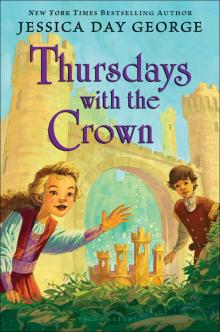 Thursdays With the Crown
Thursdays With the Crown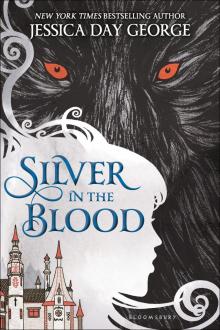 Silver in the Blood
Silver in the Blood Saturdays at Sea
Saturdays at Sea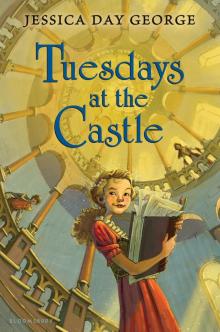 Tuesdays at the Castle
Tuesdays at the Castle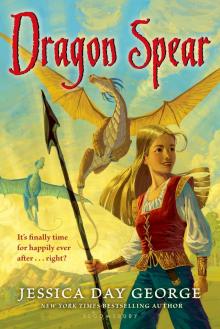 Dragon Flight
Dragon Flight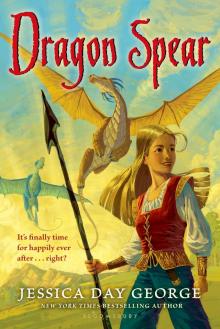 Dragon Spear
Dragon Spear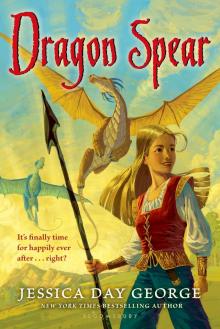 Dragon Slippers
Dragon Slippers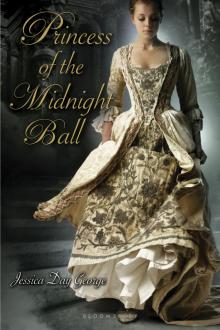 Princess of the Midnight Ball
Princess of the Midnight Ball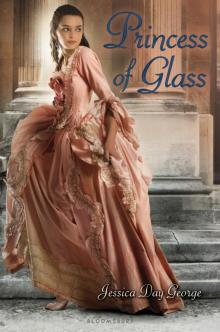 Princess of Glass
Princess of Glass Sun and Moon, Ice and Snow
Sun and Moon, Ice and Snow The Rose Legacy
The Rose Legacy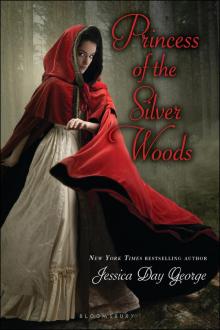 Princess of the Silver Woods
Princess of the Silver Woods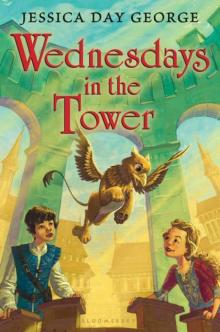 Wednesdays in the Tower
Wednesdays in the Tower The Queen's Secret
The Queen's Secret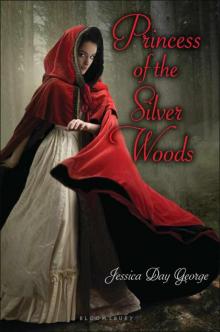 Princess of the Silver Woods (Twelve Dancing Princesses)
Princess of the Silver Woods (Twelve Dancing Princesses)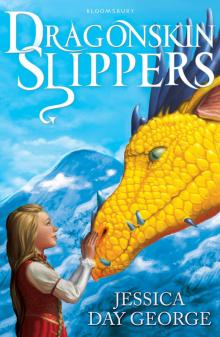 Dragonskin Slippers
Dragonskin Slippers